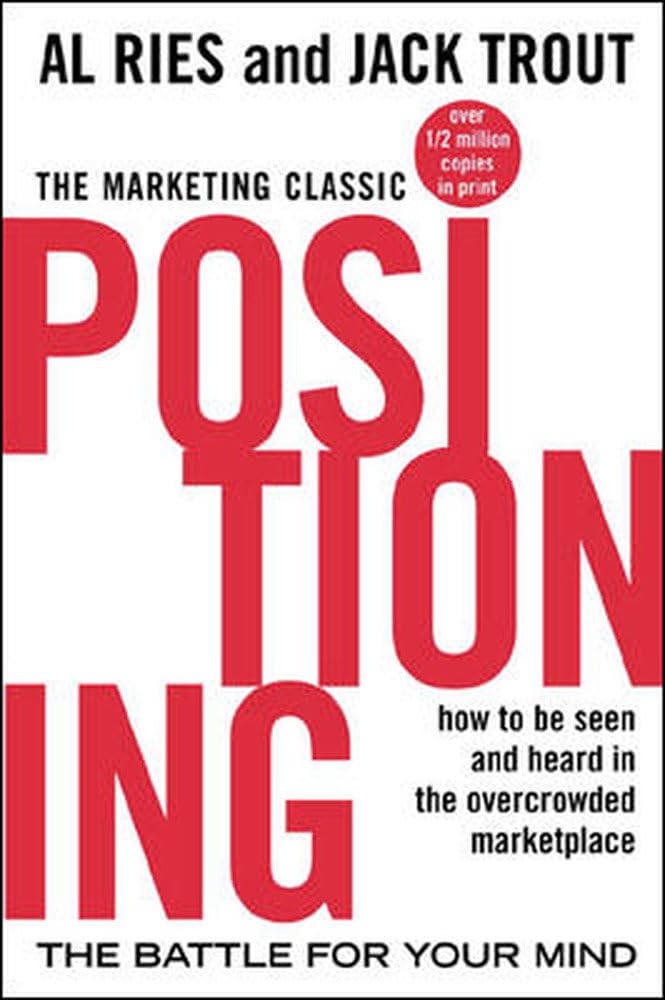https://www.amazon.com/Positioning-Battle-Your-Al-Ries/dp/00...
https://www.amazon.com/22-Immutable-Laws-Marketing-Violate/d...
Seth Godin is another author well worth reading:
https://www.amazon.com/Seth-Godin/e/B000AP9EH0
And a few others:
https://www.amazon.com/Crossing-Chasm-3rd-Disruptive-Mainstr...
https://www.amazon.com/Kellogg-Branding-Marketing-Faculty-Ma...
https://www.amazon.com/Differentiate-Die-Survival-Killer-Com...
https://www.amazon.com/Confessions-Advertising-Man-David-Ogi...
And, of course:
https://www.amazon.com/s?k=vaynerchuk
There are no magic pills though. The best thing is to read and learn from a lot of perspectives and then start to navigate the waters you happen to be sailing. No two markets or products are going to be the same. In fact, the same product will require a different based on where it is in the adoption/maturity cycle.
Furthermore, one way to avoid ending up in a feature for feature fight to the death with a bigger player is to think instead in terms of “job to be done”: https://hbr.org/2016/09/know-your-customers-jobs-to-be-done
By planning what you work on by focusing on what the customer is trying to achieve you’ll do yourself a favour when it comes to marketing as you’ll be able to speak in terms they understand.
Lastly, as you’ll see in the positioning book above, it’s not wise to completely avoid competitor analysis despite how unpleasant and draining it can sometimes be. A potential customer needs to understand why they would choose you over the incumbent. You need to know that answer before they can.
https://www.amazon.com/Positioning-Battle-Your-Al-Ries/dp/00...
It's a short read and well worth the time. I wish I'd read it before I'd built one of my products. If I had I wouldn't have wasted the development time.
The core message is that you shouldn't compete against an established market leader head on. It outlines a number of different approaches you can take.
https://www.amazon.com/Positioning-Battle-Your-Al-Ries/dp/00...
http://www.amazon.com/Positioning-The-Battle-Your-Mind/dp/00...
One of the interesting ideas the author postulates is, to put it in CS terms, that people's minds work like a dictionary. Each key associates with one and only one value. And, in this case, the key is a concept, need, category, etc.
If you ask someone in the US to name a plumber they'll probably answer "RotoRooter" without hesitation. Fast food? "McDonalds". Rental car? "Enterprise". Fast car? "Corvette".
The values side of the relationship isn't necessarily uniform across a population but some keys have more uniformity than others (Fast Food).
Once a person makes that key:value association it is really, really hard to break it, if not impossible. Politics tends to work that way too.
In the case of the web, the vast majority of people make the following key:value pair association:
"internet":".com"
And that's the end of the story.
Regarding the first one: "changing your mind is one of the most difficult things we do" -- changing our mind is almost impossible; changing other people's is down right impossible.
BUT
- It's possible to influence people before they have made up their mind.
- It's also possible to reframe / rename / re-position a subject, so that it becomes a new category about which people don't already have an opinion. Politicians do it all the time (most people are opposed to torture, but "enhanced interrogation techniques" sound both useful and reasonable, for example). Marketers also do it, sometimes, but they should do it more.
On this last topic, this book is absolutely fantastic:
http://www.amazon.com/Positioning-The-Battle-Your-Mind/dp/00...
It explains why brand extension is almost always a bad idea ("Google Play", OMG!!!!), and why "7Up: the uncola" is genius.


Given that, it sounds like you've already won, no matter what happens next.
As far as advice goes, I'll just leave a couple of book recommendations.
https://www.amazon.com/Discipline-Market-Leaders-Customers-D...
https://www.amazon.com/Differentiate-Die-Survival-Killer-Com...
https://www.amazon.com/Positioning-Battle-Your-Al-Ries/dp/00...
https://www.amazon.com/Its-that-Small-Fast-Slow/dp/006662053...